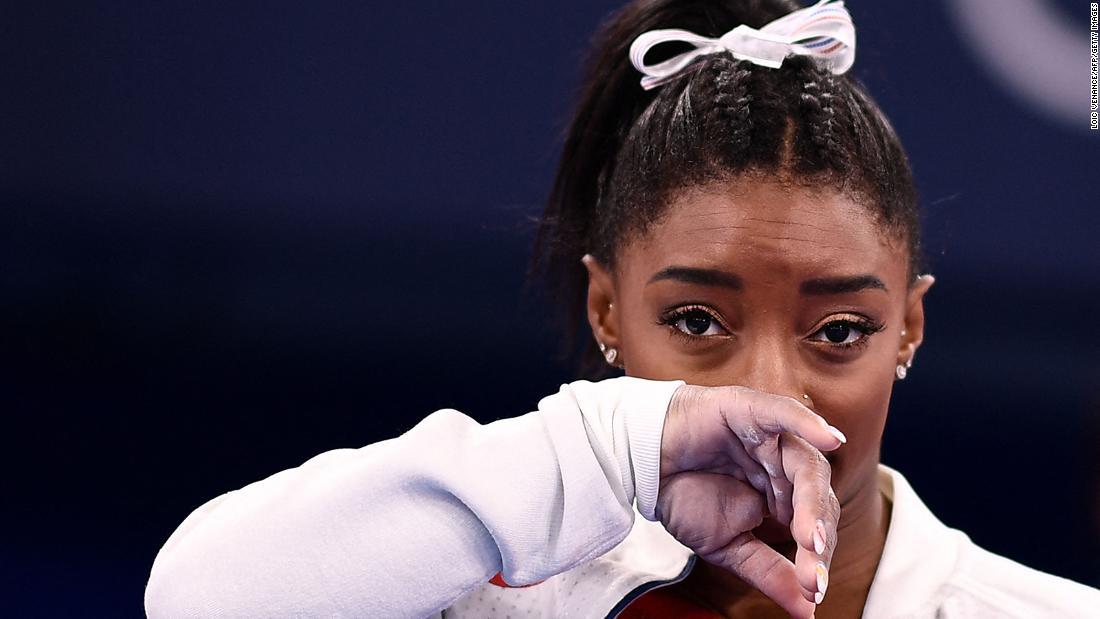Psychologist on Biles: "The world on top of a little girl" 4:21
(CNN) -
Let's recall the moment when Simone Biles, arguably the greatest gymnast of all time, awkwardly finished a jump in the Olympic Games team competition.
Think about whether, after that jump, and Biles's decision to withdraw from the rest of the competition and his individual participation, it was revealed that he had sprained his ankle.
Or that he had a stress reaction in his foot.
Or the anterior cruciate ligament had been torn.
The universal reaction would be shock and disappointment, both from not being able to compete and from not being able to see her compete.
Because we all understand that if something is wrong with your body, then of course you couldn't compete.
Now let's consider what happened.
Following his decision to withdraw from the team competition, it was revealed that he did so for mental health reasons, the same reasons why he decided to withdraw from the individual all-around competition that would begin later this week.
"Whenever you find yourself in a situation of great stress, you lose control," Biles explained to reporters on Tuesday.
"I have to focus on my mental health and not jeopardize my health and well-being. It's terrible when you fight with your own head."
advertising
The reaction, at least in some corners, was incredible: he was letting his team down.
She was letting herself down.
He just had to hang on and things would get better.
ANALYSIS |
Simone Biles and the "twisties": how fear affects the mental health and physical safety of gymnasts
What Biles' output highlights is the huge gap between the way we think about and treat physical and mental illnesses.
And our continuing, and demonstrably false, belief that the two are not interrelated.
Let's consider an example far from the Olympics.
In my late 30s my left ankle started to bother me.
I went to the doctor.
He told me I had loose cartilage and bits of bone floating around from years of basketball and sprained ankles.
He advised me to have surgery to clean everything.
I had surgery.
I went to physical therapy.
I improved.
I told anyone who asked me why he was limping, and they all understood: he hurt his ankle and they fixed it.
Fifteen years before, it was my mind that bothered me.
I had panic attacks and anxiety so overwhelming that I had to force myself to leave the house.
I didn't tell anyone.
And no one asked me why I was able to wear a mask when I was in public that made everyone think I was okay.
But anxiety affected the way I worked and lived much longer than it would my ankle.
In the end I sought help.
And talking to a psychologist helped and continues to help.
But it took me a lot longer to get that help than when my ankle started to hurt.
Because he had internalized the stigma of mental health in this country, in which admitting that you have a mental illness seemed to be one step away from being locked in a padded room, while admitting that you have a physical illness was a license to stay. at home with a good movie.
Stress, anxiety and depression: the consequences of the pandemic
Socially, we've come a long way since the onset of my anxiety in the early 2000s. Thanks to celebrities, athletes, and other high-profile people talking about their own struggles with mental illness, the stigma for the average person has diminished.
And this is good.
Because, according to Johns Hopkins statistics, "it is estimated that 26% of Americans 18 years of age or older, about 1 in 4 adults, suffer from a diagnosable mental disorder each year."
But the reaction to Biles' decision suggests that we are simply not where we need to be when it comes to understanding mental illness.
Think about what "tough" people wanted her to do: keep competing in a sport that requires cartwheels, jumps, and spins when she openly acknowledged she wasn't in the right mental space to do it and expert analysts said it was clear. who had become disoriented while in the air in that jump.
Which means that Biles would be attempting some of the sport's most difficult - and dangerous - skills while struggling, at the very least, with his ability to effectively know where he was in the air.
That's a recipe for injury and, given the cartwheels and twists Biles is capable of, potentially serious head and neck damage.
Mental health is one of the biggest problems due to the pandemic that we will face in 2021
Do you still think that physical health and mental health are not related?
In the end, Biles' class and grace in the face of armchair critics, who couldn't do a single cartwheel even if their lives depended on it, shone with their own light, and hopefully they will teach us all a lesson in importance of treating mental health in the same way that we treat physical ailments.
"We also have to focus on ourselves, because at the end of the day we are also human," Biles said.
"We have to protect our mind and our body, instead of going out to do what the world wants us to do."
Mental Health Simone Biles






